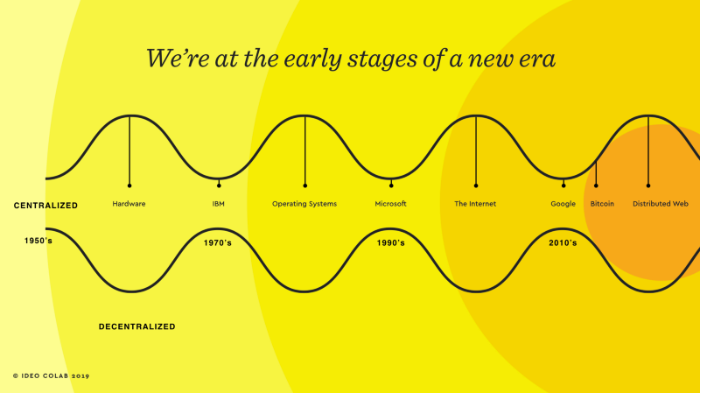Crypto has a design problem. This much we know—we published an article with that exact headline back in September. But that problem really extends to the entire blockchain space, where the concept of “design thinking” is virtually absent and company websites range from boring to baffling.
Enter a design company cofounded by a creator of the cheap, user-friendly Apple mouse of the 1980s, David Kelley. His company, Hovey-Kelley, eventually became David Kelley Design and merged with other design firms to create IDEO in 1991. IDEO has since gone on to incubate PillPack, which Amazon bought for $1 billion in June 2018, and work with clients like Google and Ford. Yesterday, CoLab, a business within IDEO, whose 20-person team works as an incubator/accelerator/design studio for tech companies, announced that it will be investing time and money in “early-stage distributed web startups and protocols” (read: blockchain and crypto projects). The announcement ended with a call to action for those working on such projects to get in touch with CoLab.
Nearly everyone we speak to about their blockchain project cites “adoption” as the main inhibitor to success. Getting help from a company with roots in Apple products, some of the most “adopted” in the world, seems like a clear-cut path to making blockchain-based products user-friendly. As for what types of blockchain products CoLab plans to work with, managing director Ian Lee told BREAKERMAG in an email, “We take a special interest in founders and projects who take a user-centered, design-driven, and collaborative approach. It doesn’t matter if you’re a security engineer, building core infrastructure, or building an open finance app, empathy for the user is key for broad adoption.” In other words, they’re not focused on reforming any specific industry touched by blockchain, just blockchain-based projects in general. CoLab would not say how much money it will be investing in these projects.
CoLab has been poised to make distributed ledgers catch on since its 2015 founding, when it started working with blockchain and cryptocurrency projects. It has invested in six such companies since 2017—Rare Bits, Messari, Handshake, Braintrust, ZeppelinOS, and a gaming company that has yet to reveal itself.
CoLab has also been working collaboratively with the likes of Augur, Grin, and Zcash. In December 2017, CoLab’s holiday blog post announced, “Happy Hodldays!” The company has positioned itself as “getting it,” and this graph it published about the “early stages of a new era,” with an awkwardly positioned point for “bitcoin,” clearly shows that if anything, CoLab is good at making nonsense look like fact with compelling design.

According to Medium posts, a team at IDEO CoLab spent a lot of this past summer figuring out how to get the non-CryptoKitty-attuned interested in cryptocollectibles and the nonfungible tokens (NFTs) that power them. They started by talking to people who collect either physical or digital items, learning that three elements were of particular importance to collectors: history, display, and community (in other words, a collectible’s history, showing off ownership to others, and being a part of a group of other collectors). Cryptocollectibles are young, visible to anyone online, and it’s hard for the largely anonymous collector base to come together in any meaningful way. It’s a challenge CoLab has identified but has yet to solve. (IDEO is famous for pioneering user-centric design that privileges feedback from humans over the on-high perspective of designers. It hires team players rather than “creative geniuses.”)
Identifying the problem is step one to solving it, however, and many in the blockchain space seem to remain blissfully ignorant to the fact that the projects they’re designing have to appeal to real people. Talking to real people who aren’t already crypto-obsessed is a legitimately reasonable (albeit obvious) start to driving adoption.
With Augur in particular, CoLab has had some practice getting “regular” people interested in a decentralized app. Whether Augur “is still considered one of the leading projects in the distributed web,” as Lee wrote, is debatable, but a whole 119 people did use it during the Super Bowl, according to DappRadar. Progress.
CoLab’s member network includes multiple high-profile businesses—inescapable names like MacDonald’s, NationalGrid, Citi, AAA, Nasdaq, and Starbucks. Maybe by asking potential users the right questions, the design firm has a chance at making the use of decentralized apps feel as common as ordering a Big Mac or a Grande Skinny Vanilla Latte.
This story has been updated to reflect the fact that CoLab is a business within IDEO, not a spinoff of the company.